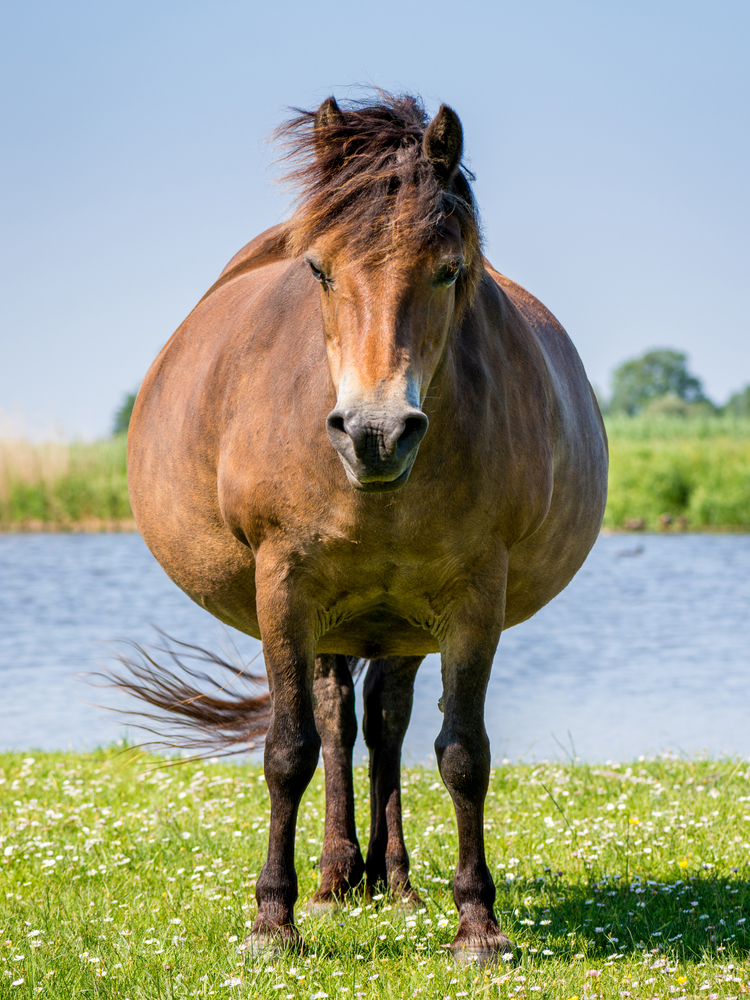After all of the time spent choosing a stallion and the effort it took to get you mare pregnant you are excited to hear the heartbeat of your future foal at her checkup between days 25-30 after she is bred! Now the long wait, 338-343 days typically but can be anywhere between 320-380 days, begins. What should you be doing with your mare during this time?
Proper nutrition, care and exercise are critical to the health of your mare and her unborn foal. Dry mares (those without a foal at their side) that are in good condition can be fed like a normal, mature horse for the first 7-8 months. Good quality forage should be the primary feed for your mare. Foals grow very slowly in the early part of gestation so nutritional demands on the mare are not high. It is important that your mare is getting a balanced diet to ensure proper growth of the foal. During the last 3-4 months of gestation the foal starts growing rapidly and your mare will start requiring more protein and potentially calories to support this growth. Mares tend to start eating less during the last 90 days before foaling due to the foal taking up a significant amount of space inside their belly. Balancing the diet for your mare during the last part of gestation is critical for a healthy, strong foal at birth. Forage and a high-quality concentrate feed are important in the late stages of gestation to ensure the foal is getting adequate amounts of trace minerals, vitamins, protein and fat. It is important to not over feed your mare, studies have shown that fat mares can have a more difficult time with foaling and obese mares have a lowered milk production. A mare should be kept in a body condition score of 5-6 according to the chart below.
Proper exercise is also very important for your mare. If your mare is currently being ridden/exercised regularly prior to breeding it is generally ok to continue moderate exercise for the first 6-8 months of her pregnancy. It is important to not cause undue stress on the mare, especially during the first two months of pregnancy, to help prevent abortion. You should never exercise your mare to excess and avoid overheating if riding in the summer months. A fit mare that has regular exercise will have an easier time foaling then one that is standing around getting fat. You should decrease exercise in the last 3-4 months of gestation. The foal starts growing rapidly during this time and it can be uncomfortable for your mare to continue to be ridden. Hand walking or ponying your mare at a walk/jog is a good form of gentle exercise in the late stages of pregnancy.
Proper health care of your mare is vital to giving your foal the best chance at staying healthy after it is born. Regular checkups by your veterinarian are important and any changes in your mare should be evaluated immediately. Your mare should be up to date on all vaccines prior to breeding. Vaccination against rhinopneumonitis will be done at months 5, 7 and 9. One month prior to foaling your mare should be vaccinated with the core vaccines, Eastern and Western encephalomyelitis, influenza, tetanus and West Nile to make sure she has the necessary antibodies in her colostrum. Your mare should also be dewormed a few weeks prior to foaling to prevent a large transfer of intestinal parasites to the foal.
When will you know its time? There are signs to look for to let you know the birth of the foal is coming soon. All mares are different but here are some reliable signs to look out for:
Filling of the udder (2-4 weeks prior to foaling)
Distension of the teats (4-6 days prior to foaling)
Waxing of the teats (1-4 days prior to foaling)
Obvious dripping of milk
When you see these signs, you will know that the long wait is nearly over, and the birth will be soon! We will talk about the foaling process in our next article! As always, please don’t hesitate to call our office with any questions or concerns. 951-444-1838.





No responses yet